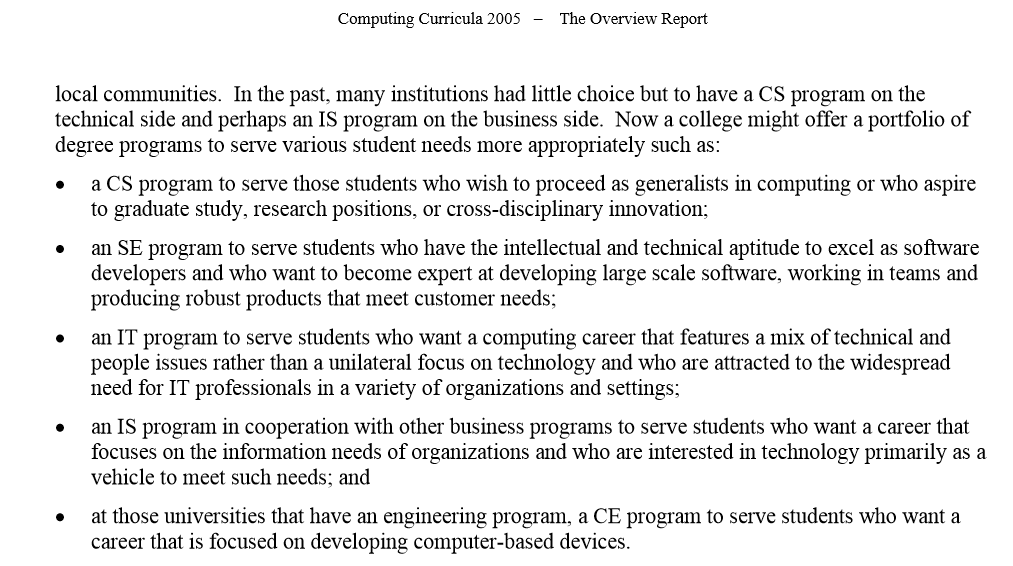GoldyOrNugget
Señor Member
- Joined
- Jul 14, 2012
- Messages
- 583
- Gender
- Male
- HSC
- 2012
I think the problem is that the term 'IT' is overloaded in this thread (and in popular culture too). The difference is explained here: http://online.king.edu/information-...mputer-science-information-technology-degree/
Essentially, IT focuses on dealing with clients and managing servers, databases, and networks. Jobs in IT include tech support, systems administration, network architect, security analyst. The programming you do in an IT position is generally limited to database access commands and short scripts for e.g. copying files or running updates.
"Pure" computer science is the study of information and computation. However, most computer science graduates go on to do software engineering, in which you design systems and implement them by programming. This encompasses everything from web development (not HTML/CSS -- that's more web design -- but JS or web frameworks, sure), to computer games, robotics, protein sequencing, low-level embedded programming, and pretty much anything else that requires software.
Unfortunately this distinction isn't that common. E.g. USyd's most prestigious computer science degree is actually called a Bachelor of Information Technology, even though the major is computer science.
Essentially, IT focuses on dealing with clients and managing servers, databases, and networks. Jobs in IT include tech support, systems administration, network architect, security analyst. The programming you do in an IT position is generally limited to database access commands and short scripts for e.g. copying files or running updates.
"Pure" computer science is the study of information and computation. However, most computer science graduates go on to do software engineering, in which you design systems and implement them by programming. This encompasses everything from web development (not HTML/CSS -- that's more web design -- but JS or web frameworks, sure), to computer games, robotics, protein sequencing, low-level embedded programming, and pretty much anything else that requires software.
Unfortunately this distinction isn't that common. E.g. USyd's most prestigious computer science degree is actually called a Bachelor of Information Technology, even though the major is computer science.
This isn't true, as I mention above. It's true that someone in IT probably won't be using a language like C or C++ because it requires concepts they wouldn't know about, but a CS graduate or software engineer can use any language. Java is the most popular language for software engineering at the moment, and you'll learn it at UNSW and USyd as well as C, C++, Haskell, Python, and whatever else they decide to teach you. Scripting languages like Python and Ruby are rapidly rising in popularity too. Most software engineers will know many languages. At my current job, we use a technology stack based on C++, Java, Python, and JavaScript, as well as plenty of specialised languages for data analysis, distributed computing, logs processing, and so on. Long-term employees tend to become proficient in all of these languages.CompSci/SENG/CompEng/BioInfo still write code, it's just that it will probably be in C, C++ if you go to UNSW or USyd, instead of a slightly higher level language like Java, where all of the low-level memory management stuff is done for you by the Java platform itself).












